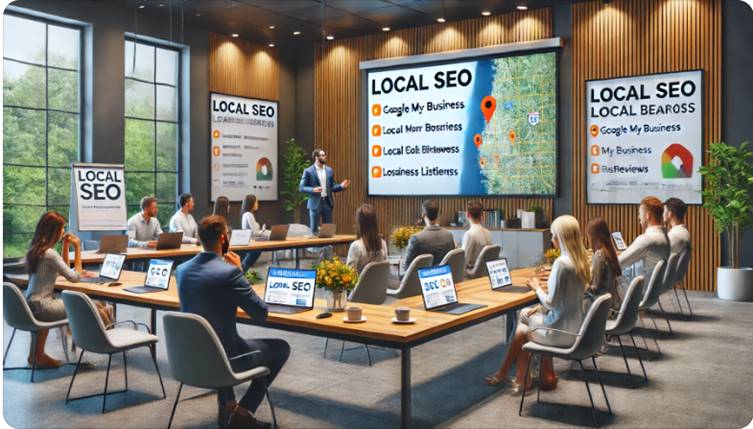In today’s digital age, local SEO has become indispensable for businesses aiming to attract local customers. Local SEO focuses on optimising your online presence to attract more business from relevant local searches. This comprehensive SEO Training guide will delve into the importance of local SEO for businesses, how to optimise your Google My Business listing, conduct local keyword research, utilise local citations and directories, and manage your online reputation through customer reviews.
Introduction to Local SEO
Local SEO is the practice of optimising your online presence to attract more business from relevant local searches. It’s crucial for any business that has a physical location or serves a specific geographic area. By improving your local SEO, you can increase your visibility to potential customers who are searching for your products or services within your vicinity.
Importance of Local SEO for Businesses
Local SEO is vital for businesses aiming to capture local market share. It helps drive local traffic, increases visibility, and builds trust with your audience.
Driving Local Traffic Local SEO ensures that your business appears in local search results, driving more foot traffic to your physical location. According to Google, 76% of people who conduct a local search on their smartphone visit a business within 24 hours, and 28% of those searches result in a purchase .
Increasing Visibility By optimising your local SEO, you can increase your business’s visibility in search engines and on platforms like Google Maps. This increased visibility makes it easier for local customers to find you.
Building Trust Appearing in local search results and having a well-optimised online presence builds trust with potential customers. Positive reviews and accurate business information can enhance your credibility.
Optimising Google My Business Listings
Google My Business (GMB) is a free tool that allows you to manage how your business appears on Google Search and Maps.
Claiming Your Business First, claim your business on GMB by verifying your ownership. This process typically involves receiving a postcard with a verification code from Google.
Optimising Your Profile Ensure your GMB profile is complete and accurate. Include your business name, address, phone number (NAP), website, hours of operation, and high-quality photos. Use relevant keywords in your business description to improve visibility.
Managing Reviews Encourage customers to leave reviews and respond to them promptly. Positive reviews can improve your rankings and attract more customers. Addressing negative reviews shows that you value customer feedback and are committed to improvement.
Local Keyword Research and Optimisation
Local keyword research helps you understand what terms people in your area are using to find businesses like yours.
Tools for Local Keyword Research Tools like Google Keyword Planner, Moz Local, and Ahrefs can help you identify local keywords. Look for keywords with high search volume and low competition relevant to your business.
Long-Tail Keywords Long-tail keywords are more specific phrases that potential customers are likely to use when they are closer to making a purchase. These keywords typically have lower competition and higher conversion rates.
Competitor Analysis Analyse your competitors’ keywords to identify opportunities. Tools like SEMrush can provide insights into the keywords your competitors are ranking for and help you develop a strategy to outrank them.
Utilising Local Citations and Directories
Local citations are mentions of your business on other websites and directories. They play a crucial role in local SEO by helping search engines verify your business’s legitimacy and information.
Importance of Local Citations Citations help search engines confirm your business’s existence and details. Consistent and accurate citations across multiple platforms can improve your local search rankings.
Top Directories Ensure your business is listed on top local directories such as Yelp, Yellow Pages, and TripAdvisor. These directories are trusted by search engines and can boost your visibility.
Consistency in NAP Maintaining consistency in your business name, address, and phone number (NAP) across all citations and directories is critical. Inconsistent information can confuse search engines and potential customers, negatively impacting your rankings.
Reputation Management and Customer Reviews
Managing your online reputation is crucial for local SEO. Customer reviews influence your search rankings and can impact a potential customer’s decision to choose your business.
Importance of Reviews Reviews are a significant ranking factor in local search algorithms. Positive reviews can improve your rankings and attract more customers. A study found that 86% of consumers read reviews for local businesses, with 91% of 18-34-year-olds trusting online reviews as much as personal recommendations .
Responding to Reviews Respond to all reviews, both positive and negative. Thank customers for positive reviews and address any issues raised in negative reviews professionally. This shows that you value customer feedback and are committed to improvement.
Encouraging Positive Reviews Encourage satisfied customers to leave reviews. This can be done through follow-up emails, signage at your location, or incentives. Positive reviews not only boost your rankings but also enhance your reputation.
Advanced Local SEO Strategies
For businesses looking to go beyond the basics, advanced local SEO strategies can provide a competitive edge.
Local Content Marketing Create content that is relevant to your local audience. This could include blog posts about local events, news, or guides. Localised content helps engage your audience and improves your local search rankings.
Geo-Targeted Advertising Utilise geo-targeted advertising to reach potential customers in specific geographic areas. Platforms like Google Ads and Facebook Ads allow you to target ads based on location, increasing the chances of attracting local customers.
Mobile Optimisation Ensure your website is mobile-friendly, as many local searches are conducted on mobile devices. A responsive design, fast loading times, and easy navigation are crucial for a good mobile user experience.
Measuring Local SEO Success
Tracking the success of your local SEO efforts is essential for making data-driven decisions and continuous improvement.
Key Metrics Important metrics to track include local search rankings, website traffic, conversion rates, and customer reviews. These metrics provide insights into the effectiveness of your local SEO strategies.
Tools for Tracking Tools like Google Analytics, Google Search Console, and Moz Local can help you track and analyse your local SEO performance. These tools provide valuable data on how users are finding and interacting with your business.
Adjusting Strategies Regularly review your performance data and adjust your strategies accordingly. Identifying areas for improvement and implementing changes can help you stay ahead of the competition and maintain a strong local presence.
Frequently Asked Questions (FAQ) on Local SEO Training
How long does it take to see results from local SEO efforts? It typically takes a few months to start seeing results from local SEO efforts. Factors such as the competitiveness of your industry and the quality of your optimisation can influence the timeline.
Is it necessary to have a physical location to benefit from local SEO? While having a physical location helps, businesses that provide services in specific areas can also benefit from local SEO by optimising for those areas.
Can I handle local SEO on my own, or should I hire a professional? You can handle local SEO on your own, especially if you have the time and resources to learn and implement the strategies. However, hiring a professional can save time and provide expertise that can accelerate your success.
How often should I update my Google My Business listing? Regular updates are important to keep your information accurate and relevant. Update your GMB listing whenever there are changes to your business, such as new hours, services, or photos.
What is the role of social media in local SEO? Social media can support local SEO by increasing your online visibility and driving traffic to your website. Engaging with your local community on social platforms can also enhance your reputation and attract more customers.
Mastering local SEO is crucial for businesses looking to attract and retain local customers. By focusing on optimising your Google My Business listing, conducting local keyword research, utilising local citations and directories, and managing your online reputation, you can significantly enhance your local presence. Advanced strategies such as local content marketing, geo-targeted advertising, and mobile optimisation can further boost your success. Regularly measuring your performance and adjusting your strategies ensures continuous improvement and long-term success in the competitive local market.



